The thyroid, a small gland at the base of your neck, plays a crucial role in maintaining your body’s metabolism, energy levels, and hormone balance. But sometimes, health conditions like cancer or hyperthyroidism require its removal.
This can lead to questions like, “Can you live without a thyroid?” and “What adjustments will you need to make?” Let’s dive into how living without a thyroid affects your body, the necessary lifestyle changes, and some common questions about survival and life expectancy without one.
Key Takeaway:
- Yes, you can live without a thyroid, but you’ll need lifelong thyroid hormone replacement.
- Without replacement hormones, serious health issues arise, including low metabolism and fatigue.
- Regular medication and monitoring allow most people to lead normal, healthy lives without a thyroid.
Table of Contents
What Does the Thyroid Do?
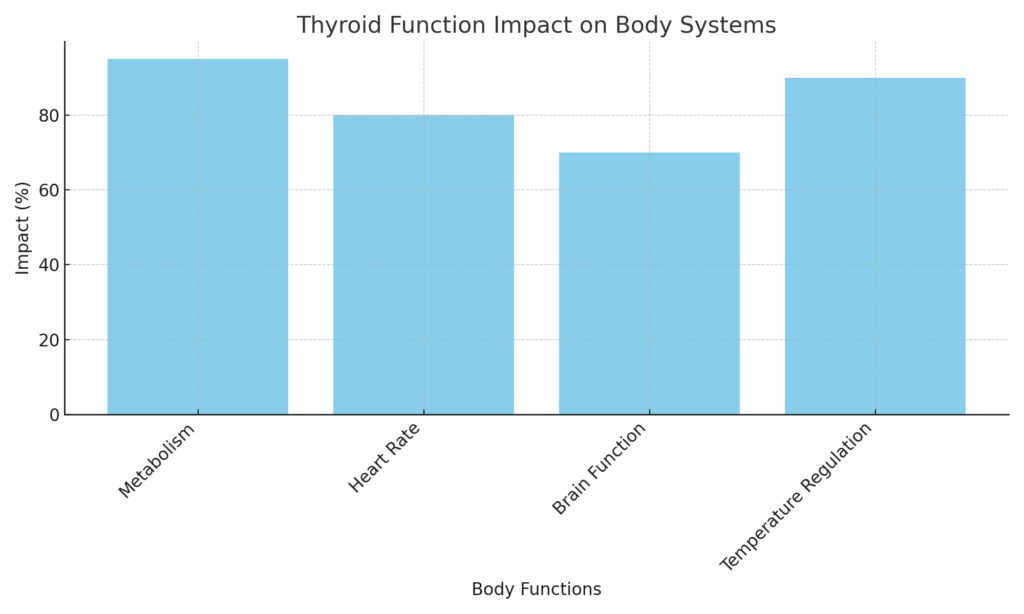
The thyroid produces essential hormones (T3 and T4) that regulate metabolism, which controls how your body uses energy. This small gland impacts almost every cell, helping maintain a healthy weight, body temperature, and energy level. It also plays a role in brain function, muscle strength, heart health, and menstrual cycles in women. Without it, the body would struggle to maintain these functions effectively.
For more information about thyroid, check here and here.
Reasons for Thyroid Removal
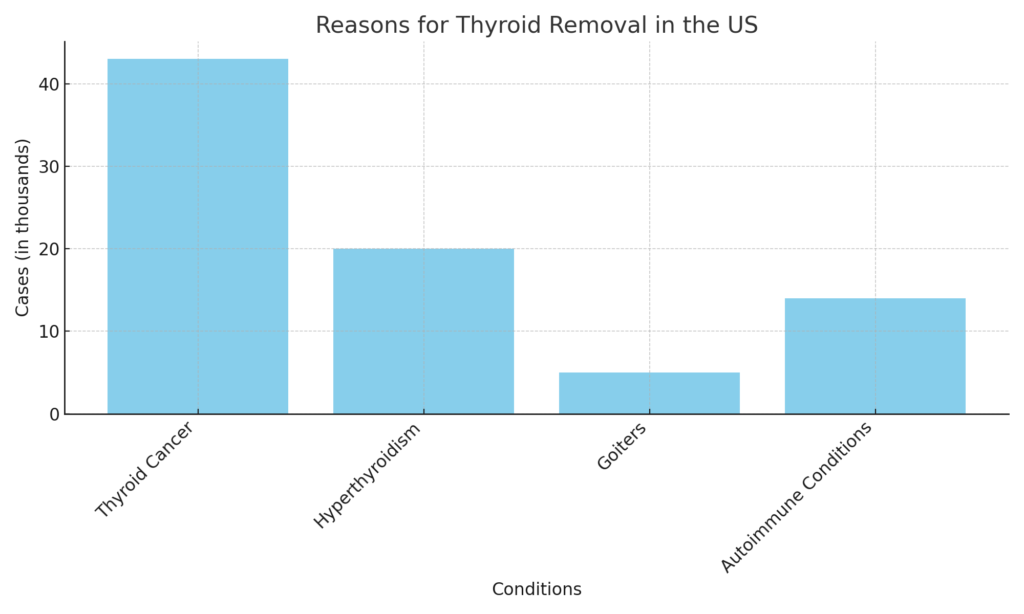
Thyroid removal, or thyroidectomy, may be necessary for several reasons:
- Thyroid Cancer: Cancer is the most common reason for thyroid removal.
- Hyperthyroidism: Overactive thyroid, often due to Graves’ disease, may require removal if other treatments don’t work.
- Large Goiters or Nodules: Enlarged thyroids can cause breathing or swallowing issues.
- Thyroiditis: Chronic inflammation, often due to autoimmune diseases, may lead to gland removal if it affects quality of life.
For more details about reasons for thyroid removal, check out here.
Can You Live Without a Thyroid?
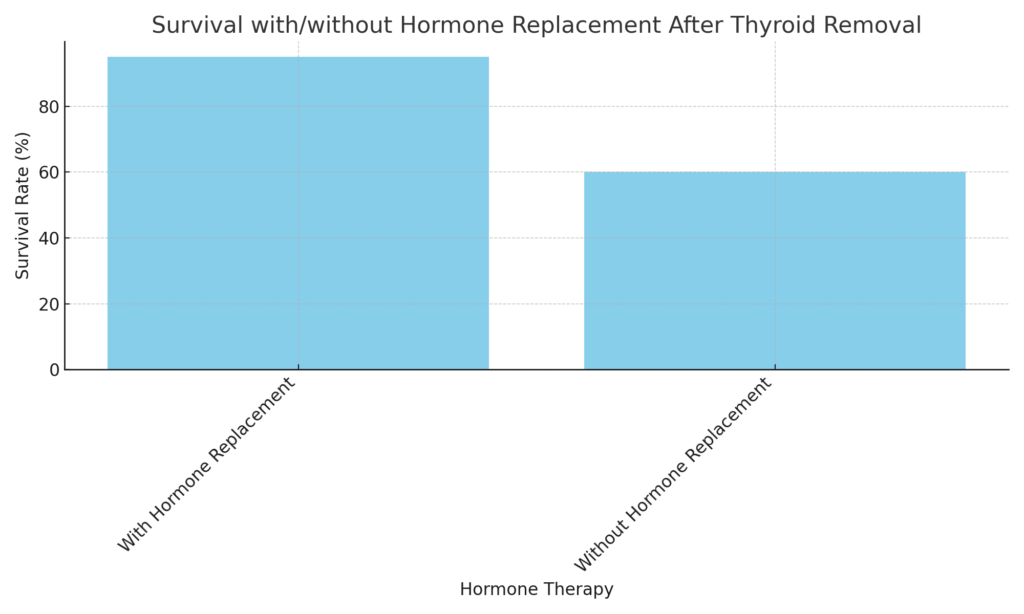
Yes, you can live without a thyroid gland. However, you’ll need to replace the hormones your thyroid once produced. This is usually done with daily medication, specifically synthetic thyroid hormones like levothyroxine. Without this replacement, your body cannot maintain its metabolic functions effectively, which could be life-threatening in the long term.
For more details, check here.
Can You Survive Without a Thyroid and No Medication?
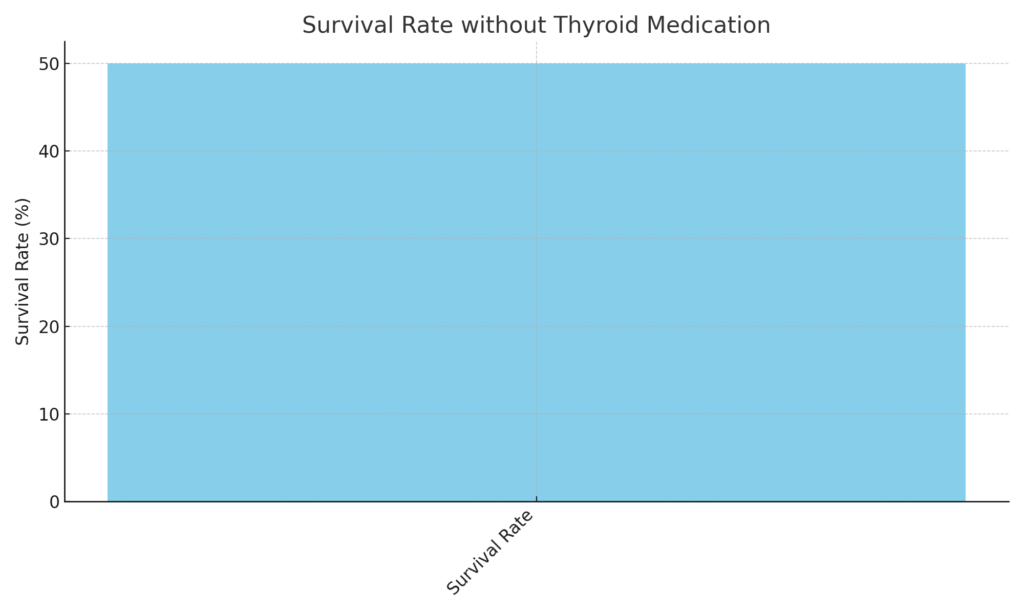
Surviving without a thyroid gland and no medication is possible, but only for a limited time. Without replacement hormones, the body enters a state called myxedema coma, a severe hypothyroid condition that can be fatal. Symptoms might start as fatigue and muscle weakness but could progress to confusion, low body temperature, and, ultimately, coma. Therefore, medication is essential for survival after thyroid removal.
For more information, check out here.
Life Expectancy Without a Thyroid
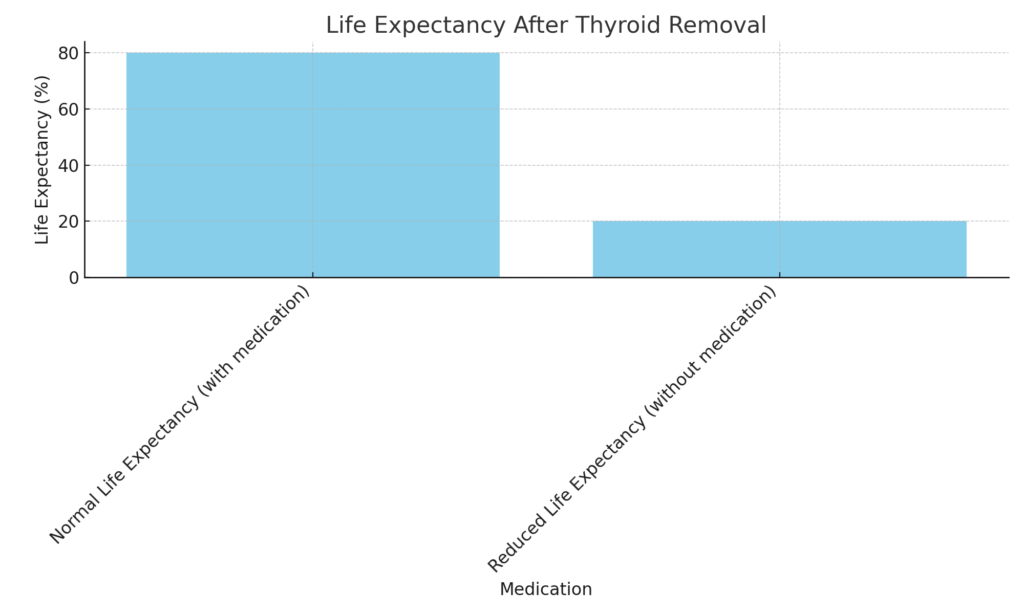
With proper medication, individuals who have had their thyroid removed can live a normal life expectancy. Modern synthetic thyroid hormones are effective at maintaining appropriate levels, enabling most people to lead a healthy, normal life without their thyroid. Without medication, however, life expectancy is drastically shortened due to severe metabolic failure.
For more details, check here.
How Long Can You Live Without a Thyroid Gland and No Medication?
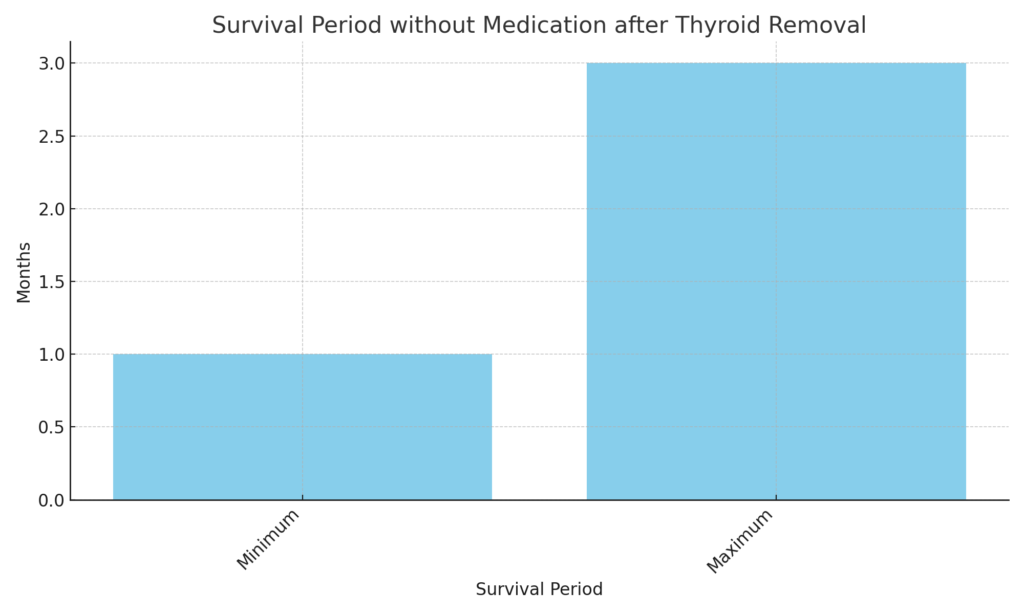
Without medication, life expectancy significantly decreases. Individuals may survive for a few weeks or months, depending on factors like overall health and age. The body’s functions will begin to slow drastically, leading to severe hypothyroidism, which is eventually fatal if untreated.
For more information, check out here.
What Are the Long-Term Effects of Having No Thyroid?
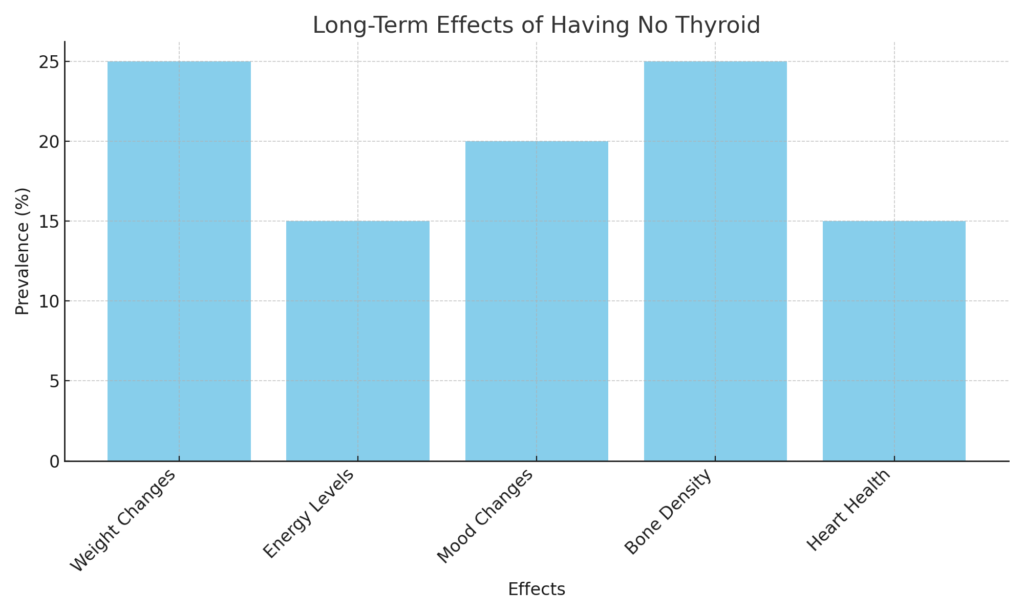
With proper hormone replacement, most people experience minimal long-term effects. However, some may experience:
- Weight Changes: It can be challenging to maintain a stable weight.
- Energy Levels: Some may experience ongoing fatigue despite medication.
- Mood Changes: Anxiety or depression may affect some people.
- Bone Density: Long-term hormone replacement can affect bone health.
Regular check-ups and monitoring with an endocrinologist can help manage these effects.
For more details about the long-term effects of thyroid removal, check out here.
What Are the Short-Term Effects of Having No Thyroid?
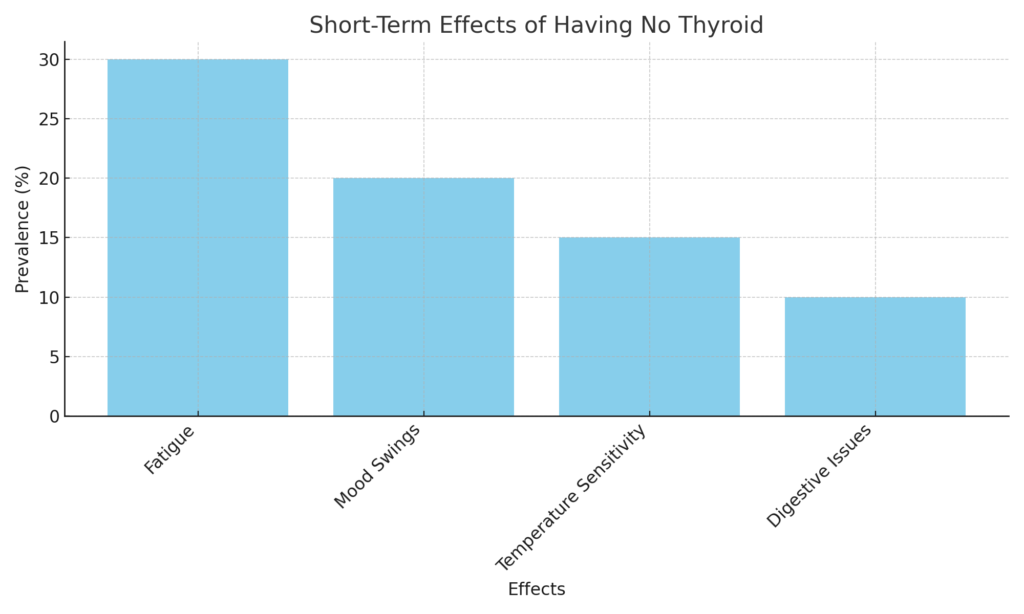
Immediately after thyroid removal, you might experience:
- Fatigue and Weakness: Adjusting to new hormone levels can be tiring.
- Mood Swings: Hormonal changes might lead to emotional ups and downs.
- Temperature Sensitivity: Many feel unusually cold or hot as the body adjusts.
- Digestive Issues: Temporary digestive changes can occur.
These symptoms typically improve as hormone replacement stabilizes in the body.
For more details about the Short term effects of thyroid removal, check out here.
Pros and Cons of Thyroid Removal
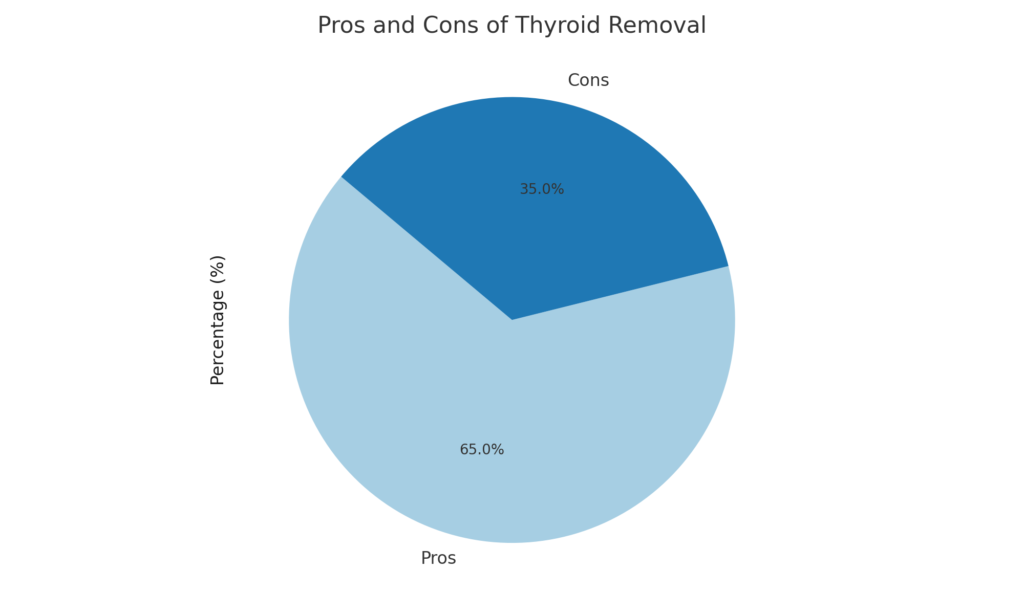
Pros:
- Cancer Treatment: Thyroidectomy can save lives for those with thyroid cancer.
- Symptom Relief: Removes symptoms related to hyperthyroidism or goiters.
Cons:
- Lifetime Medication: You’ll need daily hormone replacement for life.
- Potential Side Effects: Some may struggle with weight, fatigue, or mood issues.
- Regular Monitoring: Ongoing doctor visits to adjust medication levels.
For more information about the advantages and disadvantages of thyroid removal, check out here.
What Foods to Avoid If You Have No Thyroid
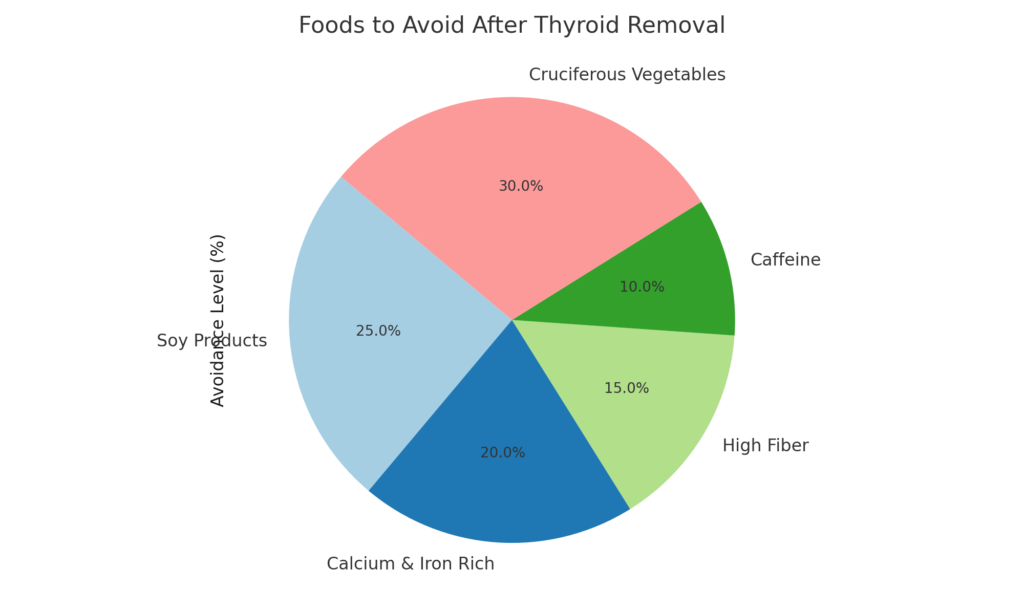
After thyroid removal, certain foods may interfere with hormone replacement absorption:
- Soy Products: Soy can interfere with hormone absorption. Limit intake.
- High-Fiber Foods: Excessive fiber may reduce hormone absorption.
- Caffeine: Can affect absorption if taken close to medication.
- Calcium and Iron Supplements: These should not be taken with thyroid medication. Allow a 4-hour gap.
For more information, check out here.
Related:
FAQs: Can You Live a Normal Life After Thyroid Removal?
Yes, most people can live a normal life after thyroid removal, thanks to hormone replacement therapy. After thyroidectomy, patients are usually prescribed levothyroxine, a synthetic thyroid hormone that compensates for the body’s natural thyroid hormone. With consistent medication, regular monitoring, and a healthy lifestyle, many people experience few symptoms and can engage in typical activities.
Can a Removed Thyroid Grow Back?
No, a fully removed thyroid cannot grow back. However, in cases where only part of the thyroid is removed, the remaining tissue can sometimes enlarge or even produce enough hormone for the body’s needs. In cases of regrowth or leftover tissue enlargement, regular medical follow-up is essential to monitor for any potential nodules or irregularities.
Can a Thyroid Patient Get Pregnant?
Yes, people who have undergone thyroid removal can still conceive and have a healthy pregnancy. However, since thyroid hormones play a critical role in pregnancy, those without a thyroid should be particularly diligent about managing their hormone levels through medication. Regular visits to an endocrinologist and obstetrician during pregnancy are crucial for optimal thyroid hormone management to support both maternal health and fetal development.
Can the Thyroid Repair Itself?
The thyroid has limited self-repair abilities, meaning that it cannot regenerate damaged or removed tissue in significant amounts. However, for certain thyroid conditions like hypothyroidism or mild cases of inflammation (thyroiditis), appropriate medication, lifestyle adjustments, and treatment may allow the thyroid to function normally without surgical intervention. In cases where the thyroid has been entirely removed, hormone replacement therapy remains necessary.
Can I Talk After Thyroid Surgery?
Yes, you can talk after thyroid surgery, although you may experience a temporary sore throat or hoarseness. The vocal cords sit near the thyroid gland, and sometimes surgery can cause swelling or temporary nerve irritation, leading to voice changes. In most cases, any hoarseness resolves within a few weeks, but if it persists, consult your doctor, as prolonged issues are rare but may require further evaluation.
What Happens to Your Body After the Thyroid Is Removed?
After the thyroid is removed, your body no longer produces natural thyroid hormones, which are essential for regulating metabolism, energy, and body temperature. To compensate, patients are typically prescribed hormone replacement medication (levothyroxine), which mimics the function of natural thyroid hormones. Without this replacement, symptoms of hypothyroidism, like fatigue, weight gain, and low mood, can develop. With proper hormone management, most people adjust well and experience minimal lifestyle disruption.
Conclusion
Living without a thyroid is possible, but it requires lifelong commitment to hormone replacement therapy. With medication, people can live a full and healthy life, though some may experience minor side effects. Regular monitoring, healthy lifestyle habits, and avoiding certain foods can help manage symptoms and ensure a balanced life without a thyroid gland.
Reference
- Shahid MA, Ashraf MA, Sharma S. Physiology, Thyroid Hormone. [Updated 2023 Jun 5]. In: StatPearls [Internet]. Treasure Island (FL): StatPearls Publishing; 2024 Jan-. Available from here
- Finke, R., Schleusener, H., Hierholzer, K. (1996). The Thyroid Gland. Thyroid Hormones, Their Origin and Their Mechanism of Action. In: Greger, R., Windhorst, U. (eds) Comprehensive Human Physiology. Springer, Berlin, Heidelberg. Retrieved from here
- Alkhatib D, Shi Z, Ganji V. Dietary Patterns and Hypothyroidism in U.S. Adult Population. Nutrients. 2024 Jan 28;16(3):382. doi: 10.3390/nu16030382. PMID: 38337667; PMCID: PMC10857224.
- Sung TY, Lee YM, Yoon JH, Chung KW, Hong SJ. Long-Term Effect of Surgery in Graves’ Disease: 20 Years Experience in a Single Institution. Int J Endocrinol. 2015;2015:542641. doi: 10.1155/2015/542641. Epub 2015 May 12. PMID: 26064111; PMCID: PMC4443923.
- Leso V, Vetrani I, De Cicco L, Cardelia A, Fontana L, Buonocore G, Iavicoli I. The Impact of Thyroid Diseases on the Working Life of Patients: A Systematic Review. Int J Environ Res Public Health. 2020 Jun 16;17(12):4295. doi: 10.3390/ijerph17124295. PMID: 32560169; PMCID: PMC7344476.
- Efremidou EI, Papageorgiou MS, Liratzopoulos N, Manolas KJ. The efficacy and safety of total thyroidectomy in the management of benign thyroid disease: a review of 932 cases. Can J Surg. 2009 Feb;52(1):39-44. PMID: 19234650; PMCID: PMC2637645.
- Núñez A, Bedregal P, Becerra C, Grob L F. [Neurodevelopmental assessment of patients with congenital hypothyroidism]. Rev Med Chil. 2017 Dec;145(12):1579-1587. [PubMed].
- Bano A, Chaker L, Mattace-Raso FUS, Terzikhan N, Kavousi M, Ikram MA, Peeters RP, Franco OH. Thyroid function and life expectancy with and without noncommunicable diseases: A population-based study. PLoS Med. 2019 Oct 25;16(10):e1002957. doi: 10.1371/journal.pmed.1002957. PMID: 31652264; PMCID: PMC6814213.
- Sorisky A. Subclinical Hypothyroidism – What is Responsible for its Association with Cardiovascular Disease? Eur Endocrinol. 2016 Aug;12(2):96-98. [PMC free article] [PubMed].
- Singh S, Sandhu S. StatPearls [Internet]. StatPearls Publishing; Treasure Island (FL): Jul 17, 2023. Thyroid Disease and Pregnancy. [PubMed].
- Bano A, Dhana K, Chaker L, Kavousi M, Ikram MA, Mattace-Raso FUS, Peeters RP, Franco OH. Association of Thyroid Function With Life Expectancy With and Without Cardiovascular Disease: The Rotterdam Study. JAMA Intern Med. 2017 Nov 1;177(11):1650-1657. doi: 10.1001/jamainternmed.2017.4836. Erratum in: JAMA Intern Med. 2017 Nov;177(11):1703. doi: 10.1001/jamainternmed.2017.6758. PMID: 28975207; PMCID: PMC5710266.
- Braun D, Schweizer U. Thyroid Hormone Transport and Transporters. Vitam Horm. 2018;106:19-44. [PubMed].
- Alyousef MY, Ghandour MK, Al-Mohawes M, Alnwaisir M, Islam T, Al Qahtani K. Long-Term Quality of Life (5-15 Years Post-Thyroidectomy) of Thyroid Carcinoma Patients in Two Tertiary Care Hospitals. Cureus. 2022 Feb 8;14(2):e22005. doi: 10.7759/cureus.22005. PMID: 35282529; PMCID: PMC8908066.
- Schweizer U, Köhrle J. Function of thyroid hormone transporters in the central nervous system. Biochim Biophys Acta. 2013 Jul;1830(7):3965-73. [PubMed].
- Mallya M, Ogilvy-Stuart AL. Thyrotropic hormones. Best Pract Res Clin Endocrinol Metab. 2018 Jan;32(1):17-25. [PubMed].
- Mughal BB, Fini JB, Demeneix BA. Thyroid-disrupting chemicals and brain development: an update. Endocr Connect. 2018 Apr;7(4):R160-R186. [PMC free article] [PubMed].
- Brent GA. Mechanisms of thyroid hormone action. J Clin Invest. 2012 Sep;122(9):3035-43. [PMC free article] [PubMed].
- Karapanou O, Tzanela M, Vlassopoulou B, Kanaka-Gantenbein C. Differentiated thyroid cancer in childhood: a literature update. Hormones (Athens). 2017 Oct;16(4):381-387. [PubMed].
- Springer D, Jiskra J, Limanova Z, Zima T, Potlukova E. Thyroid in pregnancy: From physiology to screening. Crit Rev Clin Lab Sci. 2017 Mar;54(2):102-116. [PubMed]
